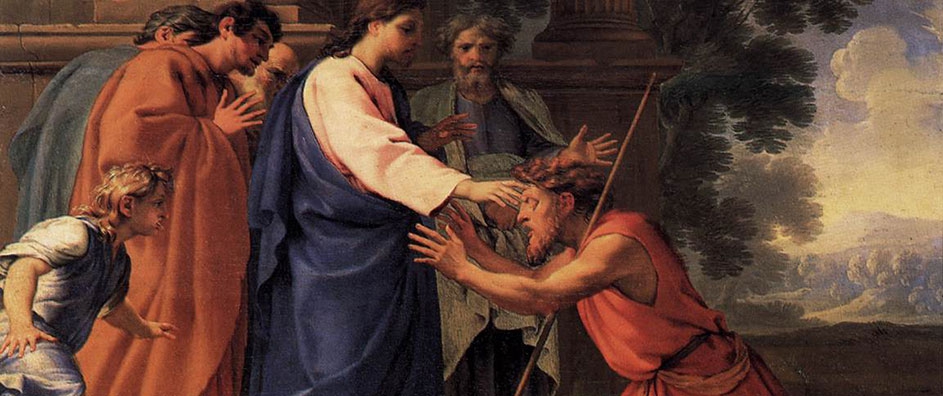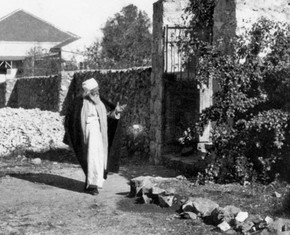The views expressed in our content reflect individual perspectives and do not represent the authoritative views of the Baha'i Faith.
Without a doubt, people were brought to Jesus for him to heal, and no doubt that he healed many. There is no reason, however, to assume that the healings of Christ broke the laws of nature — that they were somehow miraculous. Indeed, faith healings work within the laws of nature, and are common even today among peoples of all denominations and faiths.
In Christ’s time, healing was expected of spiritual teachers and practiced by many. In the Gospel of Matthew there is proof of this widespread practice. Jesus asked the Pharisees (Matthew 12:28): “And if I, by Beelzebub, cast out devils, by whom do your sons cast them out?” Casting out “devils” was an occupation engaged in by many, as it still is among primitive people.
Indeed, in that era the public saw miracles in almost anything. The Gospel of John (5:4) records that people used to gather at a certain pool where:
An angel went down at a certain season into the pool, and troubled the water; whosoever then first, after the troubling of the water, stepped in was made well of whatever disease he had.
People in those times apparently had become quite liberal in constructing fantastic associations. The Acts of the Apostles (14:11ff) records that Paul and Barnabas were taken by people to be appearances of the gods Hermes and Zeus; and thus were expected to work miracles. In fact, people expected miracles of anyone bringing a powerful message of God, hope and faith.
Miracles reported in earlier traditions may also have added pressure to ascribe miracles to contemporaries. It may have been necessary to say that Jesus walked on water because Elijah and Elisha parted the waters of the Jordan (II Kgs 2:8; II Kgs 2:14) and because Elisha had made things float that normally could not (II Kgs 6:1519). Similarly, the stories ascribed to Elijah and Elisha may have been necessary because the Greeks had reported that Orion, Poseidon’s son, walked on water. It may also have been necessary to say that Jesus raised the dead because the Old Testament prophets had done so (C.f. I Kgs 17:1724, II Kgs 4:837; 13:21), and because the Greeks had done so. In The Frogs (circa 405 B.C.) Aristophanes made Dionysius say of Hermes and his father that raising the dead was a family profession.
These tales of the miraculous often get out of hand. A writer in the second century after Christ, Lucian, remarked that he had met an old man that claimed to have seen the transfigured Proteus (also known as Peregrinus) after his cremation, and to have witnessed the vulture that he had turned into flying out of the funeral pyre. The trouble is that Lucian himself had written the story of the transfigured Proteus as a fantastical myth years before. It was fiction, not history. Lucian also reported that people would stare at any traveling musician or fortuneteller as if he were a god from heaven. With a largely illiterate and uneducated populace, these magical miracle tales proliferated.
Many historical figures supposedly delivered miracle cures and feats. Aristotle and Pythagoras reportedly performed miraculous healings, and Pythagoras was said to be the incarnate son of Hermes. Alexander the Great was said to be a descendent of the gods, and Plato was believed to be the child of the virgin Amphictione, while his father was the god Apollo.
 This love of the miraculous coupled with the desire to validate Christian faith through an appeal to miracles comparable to those ascribed to the Jewish prophets, pagan gods, and historical figures helps us understand their appearance in Christian scripture. There are indications, however, that Jesus knew peoples love of miracle stories and that he disapproved of spreading them. In the beginning of Mark’s gospel he healed some people and heard that more people were coming. So, he decided to leave and get on with the business of proclaiming his message to others. Then, when he was approached by a leper, whom law forbids touching, Jesus touched him—itself a powerful moral lesson—and cleansed him—whatever that means. Jesus, however, warned the leper to say nothing about it. The leper, of course, told everybody and Jesus’ work of teaching was stalled (Mark 1:32-45).
This love of the miraculous coupled with the desire to validate Christian faith through an appeal to miracles comparable to those ascribed to the Jewish prophets, pagan gods, and historical figures helps us understand their appearance in Christian scripture. There are indications, however, that Jesus knew peoples love of miracle stories and that he disapproved of spreading them. In the beginning of Mark’s gospel he healed some people and heard that more people were coming. So, he decided to leave and get on with the business of proclaiming his message to others. Then, when he was approached by a leper, whom law forbids touching, Jesus touched him—itself a powerful moral lesson—and cleansed him—whatever that means. Jesus, however, warned the leper to say nothing about it. The leper, of course, told everybody and Jesus’ work of teaching was stalled (Mark 1:32-45).
Miracles were actually a hindrance, then and now, to the proclamation of God’s message. They prevented the literal from apprehending and understanding the metaphorical:
The outward miracles have no importance for the people of Reality… Observe: those who in appearance were physically alive, Christ considered dead; for life is the eternal life, and existence is the real existence…. Consequently, whenever it is recorded in the Holy Books that such a one was blind and recovered his sight, the meaning is that he was inwardly blind, and that he obtained spiritual vision, or that he was ignorant and became wise, or that he was negligent and became heedful, or that he was worldly and became heavenly. – Abdu’l-Baha, Some Answered Questions, pp. 100-102.
















Comments
Sign in or create an account
Continue with Googleor